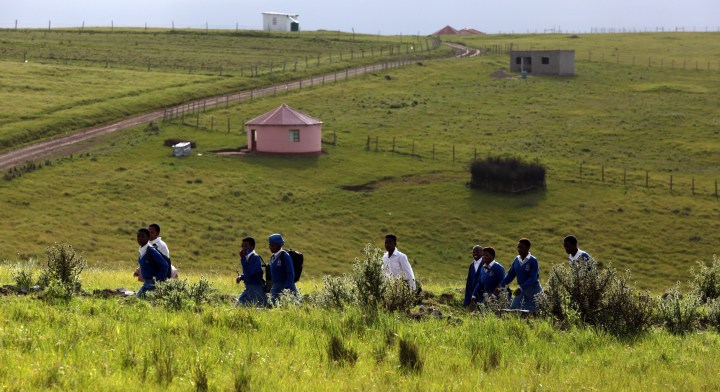WOMEN'S RIGHTS OP-ED
Freedom Day: Period poverty, stigmas and threats specific to women are challenging our female liberties

What makes girls and women unfree in South Africa today? What holds them back? The list of factors is depressingly complex.
Young women and girls are faced with a range of daunting, interrelated forces in South Africa today. Period poverty, gender-based violence, the constant threat of rape, gender inequality, unemployment and social ills, from HIV/Aids to poverty. This is not news. We all know the bleak picture; it has been normalised – the statistics and numbers blur into a dystopian reality. Yet when you meet one of those statistics, the person can’t help but jump out at you.
I met Jessica, a 15-year-old Gr 10 learner at her school, about 42km outside Pretoria. I_Menstruate launched its preliminary research report (Full report to be published on 24 May, 2023) at MH Baloyi High School in March 2023.
I found in Jessica an embodiment of what we identified in our findings: 89% of schools do not provide menstrual hygiene products on a regular basis, and 83% of learners do not have regular access to pads and tampons. Jessica has to grapple with period poverty.

(Source: I_Menstruate)
Thousands of girl learners are affected by period poverty both at home and school. According to Dr Mpume Zenda, known as “Dr Gynae”, who spoke at the launch (along with Jessica), period poverty is part of menstrual hygiene management which includes access to information, products, and sanitation, and doing all of this with dignity. “I do not have regular access to pads – they tend to be expensive and sometimes my family has to put food first on the grocery list” said Jessica, showing the impact of unchecked food and general inflation. Girls’ needs have to compete with family hunger, a choiceless choice where oppressive reality intimately communicates the value of girls. She went on to explain how sometimes the school toilets don’t have running water on a regular basis, making it difficult for her to manage her period. “It means I have to miss some of my favourite activities like coding and debating, many times”.
Poor school sanitation problems
Poor school sanitation is an ongoing problem, with low-income schools suffering most. Jessica is forced to manage her period in an inadequate school setting, affecting her confidence, her sense of comfort, her dignity. “My friends sometimes miss school or certain classes for the same reasons. It is frustrating and humiliating. This is something that happens a lot, yet even the boys in our class don’t realise why.”
Jessica is starting to think about the differences between boys and girls, men and women, the haves and the have-nots, those who are safe and those who are vulnerable. The difference in understanding between girls and boys in the same class, in the same school, reflects a well-known divide in society. Women and men are forced to experience the world differently, with different benefits, opportunities and harms. Jessica lives in a community where she cannot walk freely, living the curious life of a teenager, without fear of being robbed or raped or killed. Again, this is something that is normalised across South Africa – where can a girl walk freely, sure of her safety, free to experience places and things?
Jessica explained that, in her experience, violence against girls and women is justified. It’s always the girls’ fault, somehow. “I live in a place where girls and boys are held to different standards. Where boys are praised for the same things that girls are shamed for – dressing well, having ambitions, wanting nice things.” It’s taken further, making menstruation subject to that same irrational categorisation. Jessica’s experience is of menstruation being a taboo, no matter how natural and innate to being human it is.
It is seen as a “girls’ issue” that is considered irrelevant, unimportant, messy, gross, dirty, something for women to deal with, hidden away, without bothering the rest of the world. Girls who bleed are seen as unclean, and then the world makes it so that they can’t afford menstrual hygiene products, which makes hygiene difficult, which the world then mocks women for, and calls it a taboo.
The real cost
That’s an easier – and cheaper! – response from society than free pads, tampons and menstrual cups with facilitative socio-economic infrastructure (menstrual leave, accommodating healthcare, better access). Indeed, it is very economically savvy for the powers that be to leave all costs of a key part of human reproduction to women alone, individually, skewed more heavily for black, poor women.
What is menstrual hygiene management? Key word for us is #dignity 🩸📚#I_Menstruate #PeriodPoverty#menstruation #education #WCW #MenstrualHygieneManagement pic.twitter.com/um9leFuxyY
— I_Menstruate Movement (@I_MenstruateZA) April 5, 2023
If we are “unclean” it is not because we have no dignity. It is because of poverty. Poverty grips girls and women and refuses to let go. President Ramaphosa said last year that women remained the face of South African poverty. “In the second quarter of 2022, 47% of South African women aged between 15 and 64 years were recorded as economically inactive. This means that almost half of the working-age women in our country are not active as part of the labour force, compared to 36% of their male counterparts.”
This means that almost half of the working-age women in our country are not active as part of the labour force, compared to 36% of their male counterparts. It is black girls and women who are most affected, according to that article.
Poverty for black girls and women is threatening to become a deep pit none can climb out of. Discussions with Jessica made me realise that she has about a 50% chance of being unemployed after school. For every girl I_Menstruate spoke to, only half will find a job, with even fewer finding a well-paid one. That’s not a lot of hope. And worse, Jessica continued, “it doesn’t seem like there’s much that the government is doing to change these prospects for me”.
The added context of South Africa’s crime, violence and load shedding (all normalised to just be how South Africa “is”), the picture gets worse. There really isn’t much hope. We celebrate Freedom Day in April. Yet young people like Jessica say that they don’t have much freedom, “not in the way it matters most”.

(Source: I_Menstruate)
To Jessica, freedom means living in a community where girls are treated fairly, seen, heard and feel safe. “I learned about the meaning and importance of Freedom Day, 27 April 1994, from a history book in Gr 7 and I am wondering what it feels like to vote every five years but not see real change,”
We will always and must celebrate the fall of apartheid, the right to vote, the heart-rending queues that went on for days, our elders clinging onto ID books, burnishing the excitement they waited their whole lives for. But as 1994 recedes into history, now more than a generation back, how do we continue to make inkululeko (freedom) mean something true, real and tangible for girls like Jessica? DM/MC
Tracey Malawana is the founder of I_Menstruate, a movement that works to eradicate period poverty in South Africa through movement building, awareness raising, education, advocacy and direct service.



















Comments - Please login in order to comment.